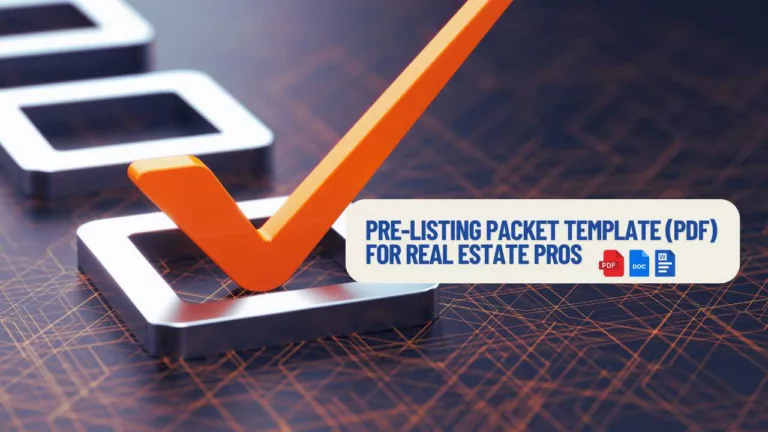
REAL ESTATE AGENT / DEFINITIONS
Real Examples for 2024

By: Joe Stephenson REALTOR®
- What are Seller Concessions?
- Examples of Seller Concessions
- How Seller Concessions Work
- Advantages and Disadvantages
- FAQs
- Join Our Newsletter
Terms like seller concessions, mortgage discount points, and down payment amount might sound complex, but understanding them could save you money. Seller concessions, in particular, can be a key part of making a deal work for both buyers and sellers. If you’re purchasing a primary residence, an investment property, or seeking a loan through programs like Veterans Affairs (VA), Fannie Mae, or the Department of Agriculture USDA, then seller concessions play a major role in shaping your costs.
These concessions can help cover expenses such as recording fees, an appraised value shortfall, or even a home warranty. For buyers, this means having a portion of their closing costs or even their loan amount addressed, helping to lighten the financial load. For sellers, offering concessions may be the incentive needed to keep the deal moving forward. But what exactly can concessions cover, and where do real estate professionals, the National Association of REALTORS®, and even a tax professional come in?
This “min read” guide will explore the world of seller concessions, from negotiating concessions to understanding maximum seller concessions, comparing their value against comparable properties, and strategizing how they can cover the cost of buyer expenses. The seller pay on real estate deals that meet their criteria
Definition
Seller concessions, also known as seller contributions or seller assists, refer to the practice where the seller agrees to absorb certain costs associated with the home buying process, typically closing costs, to facilitate a real estate transaction.
This can be seen as a gift from the seller to the buyer, reducing the financial burden on the buyer.
- Seller concessions may cover closing costs, loan origination fees, and appraisal fees.
- They may be used to attract potential buyers in a competitive market.
- Understanding seller concessions can help both buyers and sellers navigate the real estate market more effectively.

Examples of Seller Concessions
Seller concessions are a key tool in real estate transactions, often making the difference between a deal that closes and one that falls through. Here’s an example to illustrate how they work.
Consider a young couple, the Johnsons, who have been diligently saving for their first home. They’ve managed to set aside $20,000 for a down payment on a $200,000 home.
However, they’re apprehensive about the additional costs that come with buying a home, specifically the buyer’s closing costs, which can range from 2% to 5% of the purchase price.
Their real estate agent suggests asking for seller concessions. The Johnsons decide to make an offer on a home priced at $200,000 and ask for a 3% seller concession to cover their closing costs. This means they’re effectively asking the seller to contribute $6,000 towards their closing costs.
The seller agrees, understanding that this could help facilitate the sale. As a result, the Johnsons can use their saved money entirely for the down payment, without having to worry about the closing costs.
Here are some common costs that seller concessions often cover.
- Loan origination fees – These are fees brought by the lender for the processing of a new loan application.
- Home inspection fees – A home inspection is typically required to ensure the property is in good condition.
- Appraisal fees – This is the cost of determining the fair market value of the home.
- Title search and insurance – These costs ensure the seller has the legal right to sell the property and protect against future property ownership claims.
- Underwriting fees – These are fees charged by mortgage lenders to evaluate the risk of lending to a particular borrower.
Seller concessions can be a win-win situation for both parties in a real estate transaction. The buyer can save money and potentially afford a home they might not have been able to otherwise, and the seller can attract more potential home buyers and expedite the sale of their property.
Whether you’re a buyer considering a conventional loan or a government-backed loan, don’t hesitate to ask for seller concessions—it could make your home purchase more affordable.

How Seller Concessions Work
Seller concessions work by the seller agreeing to pay for certain upfront costs typically borne by the buyer.
This reduces the amount of money the buyer needs at closing. The concession is usually a percentage of the home’s purchase price.
- Seller concessions can cover most closing costs including title insurance, home inspection fees, and discount points.
- The exact amount of the concession can vary depending on factors like local market conditions and the buyer’s loan program.
- Both the buyer and seller must agree to the terms of the seller concessions.
I have personally used seller concessions in multiple ways over my career, so they can be quite useful.

Advantages and Disadvantages of Seller Concessions
Seller concessions offer advantages for both the buyer and seller.
For buyers, they reduce the amount of cash needed at closing. For sellers, they can make the property more attractive to potential buyers, especially in a buyer’s market.
However, there are also disadvantages. For sellers, offering concessions can reduce their net proceeds from the sale. For buyers, if the price of the house is inflated to accommodate the concession, it could affect the appraisal.
- Advantages for buyers: lower upfront costs, less money needed at closing.
- Advantages for sellers: attract more buyers, potentially speed up the sales process.
- Disadvantages for sellers: lower net proceeds, potential difficulty with appraisal.
- Disadvantages for buyers: potentially higher purchase price, potential issues with mortgage lenders.
I have seen the benefits go multiple ways in seller concessions. It’s just a matter of deciding what is best for you at the time.

Seller Concession vs. Price Reduction
A seller concession differs from a price reduction in that it does not reduce the home’s purchase price.
Instead, the seller agrees to take on some of the costs usually paid by the buyer. A price reduction, on the other hand, directly reduces the selling price of the property.
- Seller concessions can make a home more affordable for buyers without reducing the asking price.
- Price reductions lower the overall cost of the home but do not help with closing costs.
- Both strategies can be effective depending on the circumstances and local market conditions.
Who Benefits From Seller Concessions?
Both the buyer and seller can benefit from seller concessions.
Buyers benefit because they need less cash at closing.
Sellers benefit as concessions can make their property more attractive, which can be especially helpful in a buyer’s market.
- Buyers benefit by having lower upfront costs.
- Sellers benefit by making their property more appealing to potential buyers.
- The benefits for each party depend on the housing market conditions and individual financial situations.

What Can Seller Concessions Cover?
Seller concessions can cover a wide variety of costs associated with the home buying process. These may include the following.
- Closing costs – These are fees associated with finalizing a real estate transaction and can include title insurance, home inspection fees, and loan origination fees.
- Prepaid expenses – These are costs paid in advance, such as property taxes and homeowner’s insurance.
- Discount points – These are fees paid to the lender at closing in exchange for a reduced interest rate.
Who Benefits from Concessions, Buyers or Sellers?
While both parties can benefit from seller concessions, the primary beneficiary is typically the buyer. Seller concessions reduce the amount of cash the buyer needs to close the deal and can make home ownership more accessible.
- Buyers benefit from reduced upfront costs.
- Sellers may benefit by making their property more appealing to potential buyers.
- The exact benefits for each party depend on the local market conditions and individual financial situations.

How to Negotiate Seller Concessions
Negotiating seller concessions involves several steps. First, the buyer should determine how much assistance they need with closing costs. Then, with the help of a real estate agent, the buyer can request seller concessions as part of their offer.
- Determine how much assistance you need with closing costs.
- Work with a real estate agent to request seller concessions in your offer.
- Be prepared to negotiate and potentially compromise with the seller
Can Sellers Refuse to Contribute Toward My Closing Costs?
Whether or not a seller agrees to concessions depends on various factors such as the housing market, the seller’s financial situation, and the competitiveness of the offer.
- A seller may refuse concessions if they have multiple bids or if it’s a seller’s market.
- Sellers may be more likely to agree to concessions in a buyer’s market.
- Each situation is unique and depends on various factors
Know The Market
Understanding the current housing market is crucial when considering seller concessions.
In a buyer’s market, where there are fewer buyers than properties, sellers may be more willing to offer concessions to attract buyers.
Conversely, in a seller’s market, where there are more buyers than properties, sellers may be less inclined to offer concessions.
- In a buyer’s market, sellers may offer concessions to attract buyers.
- In a seller’s market, sellers may be less likely to offer concessions.
- Understanding the current market can help both buyers and sellers make informed decisions.

Are There Limits To Seller Concessions?
Yes, there are limits to seller concessions. These limits vary depending on the loan type. For example, conventional loans typically allow seller concessions of up to 9% of the home’s sale price, while FHA and USDA loans limit seller concessions to 6%.
- Conventional loans: Seller concessions can be up to 9% of the home’s sale price.
- FHA loans: Seller concessions are limited to 6% of the home’s sale price.
- USDA loans: Seller concessions are also limited to 6% of the home’s sale price.
(Note: Please check with a mortgage loan office or consultant for good measure. These factors have a tendency to change over time.)
Buyer’s Markets vs. Seller’s Markets
In a buyer’s market, there are more properties for sale than there are buyers, making it a great time for buyers to negotiate seller concessions.
In a seller’s market, there are more buyers than properties, making it less likely for sellers to offer concessions.
- Buyer’s markets can be advantageous for negotiating seller concessions.
- Seller’s markets may make it more difficult to negotiate for seller concessions.
- Understanding the current market conditions is key when considering seller concessions
Seller Concession Limits by Loan Type
The limits on seller concessions vary by loan type. Conventional loans typically allow for seller concessions of up to 9% of the home’s sale price.
FHA and USDA loans limit seller concessions to 6%, and VA loans do not have a strict limit but require that concessions do not exceed the buyer’s actual costs.
- Conventional loans: Up to 9% of the home’s sale price.
- FHA loans: Up to 6% of the home’s sale price.
- USDA loans: Up to 6% of the home’s sale price.
- VA loans: No strict limit, but concessions cannot exceed the buyer’s actual costs.
Join our Newsletter to Learn More About Real Estate from Joe Stephenson
Stay informed about the latest trends and tips in real estate by joining our newsletter.
We’ll keep you updated on everything from how to negotiate seller concessions to understanding the nuances of the local market.
Sign up today to start your journey towards becoming a more informed home buyer or seller.






